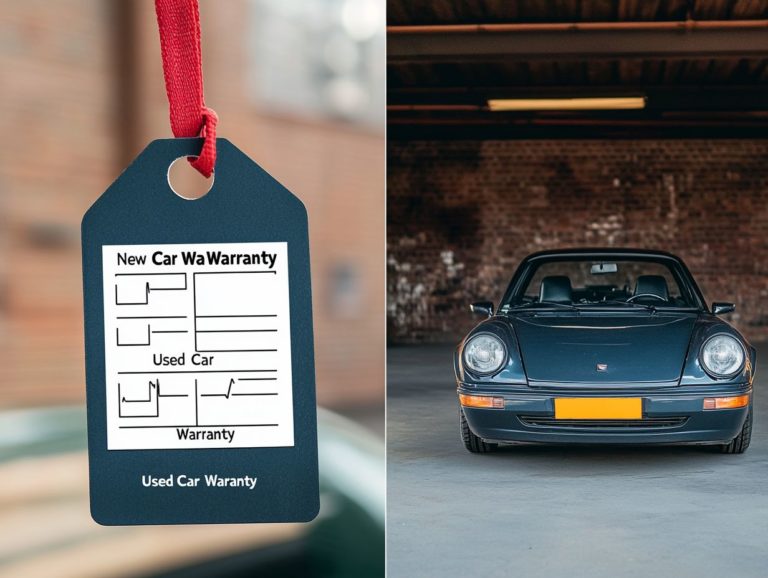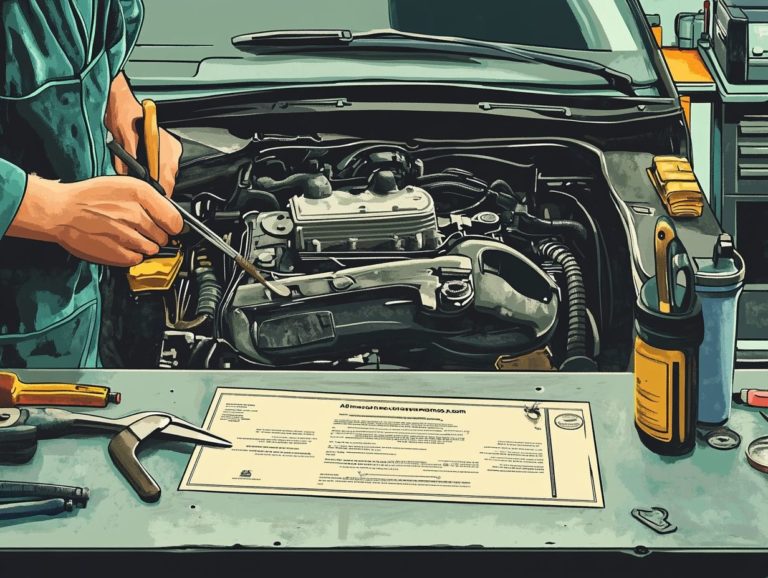Understanding the Claims Process for Car Warranties
Understanding car warranties is your key to peace of mind! It’s essential for protecting your valuable investment. Navigating the world of car warranties can feel daunting, but grasping the intricacies is crucial.
This guide unpacks what a car warranty entails and explores the various types available. You ll be well-informed about what you re committing to.
It delves into the claims process, detailing the steps you need to take and the necessary documentation. You’ll also learn about common pitfalls that could lead to claim denials.
You will find practical tips for filing a claim and managing disputes with warranty providers. Whether you re a new car owner or simply seeking to refresh your understanding, this comprehensive guide is designed to equip you with all the knowledge you need.
Contents
Key Takeaways:

- A car warranty is a contract that covers the cost of certain repairs or replacements for a specific period.
- The claims process for car warranties involves filing a claim, keeping records, and knowing common reasons for claim denials.
- To increase the chances of a successful claim, prepare and present all necessary information carefully. Consider legal options if disputes arise with the warranty provider.
What is a Car Warranty?
A car warranty is essentially your safety net, offering repair and replacement coverage for specific components of your vehicle. It ensures you can drive with confidence and shields you from unexpected costs that can arise from vehicle malfunctions.
The specifics of these warranties can vary significantly based on the vehicle manufacturer and the type of vehicle. The duration of coverage can also differ. Whether you re looking at new or used cars, there are options tailored to meet your needs. You can choose the protection that best suits your situation.
Definition and Types of Warranties
Car warranties come in various forms, including manufacturer s warranties, extended warranties, and additional coverage that you can customize. Each provides distinct levels of coverage for your vehicle’s components and services.
These warranties are essential safeguards for vehicle owners. The journey typically begins with the manufacturer’s warranty, covering specific repairs and replacements for a limited time usually three to five years or a set mileage limit, whichever arrives first.
When that initial coverage runs its course, you can explore extended warranties. They offer an additional layer of security against potential breakdowns and often cover a broader array of issues for several more years.
Service contracts allow you to handpick specific components for coverage. Whether it s roadside assistance or rental car reimbursement, these contracts cater to your unique driving needs and preferences.
Understanding the Claims Process
Understanding the warranty claims process is crucial for car owners aiming to make the most of their warranty. This process involves several steps that demand precise documentation and clear communication with your warranty provider. This ensures you receive timely repairs or replacements when needed.
Steps to Filing a Claim
Filing a claim with your car warranty provider requires a few essential steps to set you on the right path, including understanding the scope of car warranty coverage.
- First, gather all necessary documentation, including your warranty agreement, vehicle purchase receipts, and any prior service records that could bolster your claim.
With your documents in order, reach out to your warranty provider through their customer service hotline or online portal. Be ready to share detailed information about the repairs needed; clarity here can make a significant difference in the claims process.
Once your claim is submitted and approved, the next step is to choose an authorized repair service from the provider’s list. It’s wise to select a shop with a solid reputation and experience in handling the specific repairs required. This is vital for preserving your warranty coverage.
Don t wait! Gather your documents now to ensure that any potential issues are resolved swiftly.
Documentation and Requirements

Proper documentation is essential when you file a claim. Warranty providers require specific information to process it efficiently. This includes proof of ownership, maintenance records, and details about the repair needed.
You may need to provide warranty details outlining coverage specifics. Keeping this documentation organized helps streamline the claims process, minimizing potential delays and frustrations.
This preparation leads to a timely resolution. It ensures all necessary evidence is available to support your claim. Adhering to these documentation practices paves the way for smoother interactions with your warranty provider.
Common Reasons for Claims Denial
Claims can be denied for various reasons. Understanding common pitfalls helps you avoid frustration during repair or replacement of your vehicle.
What s Not Covered
What s not covered in your car warranty defines conditions where claims can be denied. Common exclusions include normal wear and tear something that s bound to happen over time as well as damage from misuse, like racing or off-road driving. Unauthorized repairs can also void your warranty, leaving you exposed to significant repair expenses.
By understanding these limitations, you can take proactive measures to keep your car in optimal condition while adhering to warranty guidelines. This insight helps preserve your vehicle’s integrity and maximizes your chances of successfully filing claims when legitimate issues arise, ultimately safeguarding your investment.
Tips for a Successful Claim
To enhance your chances of a successful claim, focus on key strategies to improve your claim:
- Prioritize thorough documentation,
- Maintain clear communication with your warranty provider,
- and understand your warranty terms.
These steps will significantly improve your likelihood of a favorable outcome.
Preparing and Presenting Your Claim
Gather all necessary documentation before filing your claim. This includes receipts, service records, and any prior correspondence related to the warranty.
Outline specific issues like descriptions of malfunctions and details of any repair attempts. Approaching your claim with clarity and professionalism enhances your chances of approval and helps establish a credible narrative that resonates with the warranty provider.
This methodical preparation can save you considerable time and alleviate potential misunderstandings during the review process.
Dealing with Disputes

Navigating warranty disputes can be challenging. Understanding your rights helps you manage these issues effectively.
Resolving Issues with the Warranty Provider
Resolving issues with your warranty provider demands effective communication and a clear understanding of how to make a claim. This ensures both parties can reach a satisfactory resolution.
To navigate this successfully, gather all relevant documentation, such as purchase receipts and any prior correspondence, before reaching out. Presenting your case clearly and methodically will highlight the key points and strengthen your position.
Effective communication also involves paying close attention to what the other person is saying. By understanding the provider s perspective, you can tailor your responses and address any concerns they might have.
Following up on your claims shows your commitment and can speed up the resolution process, ultimately leading to a more favorable outcome.
Legal Options for Disputes
When disputes with warranty providers can t be settled through simple conversation, you should know your legal options, such as mediation or litigation, to safeguard your rights as a consumer.
Mediation often leads to quicker resolutions without lengthy trials, saving both time and legal fees. However, it may not always guarantee compliance from the warranty provider.
On the other hand, litigation allows you to make your case definitively in a courtroom. While it offers a robust option for asserting your rights, it can be a costly and time-consuming journey. Depending on your situation, small claims court might also be a straightforward and viable option.
Consulting with legal professionals or consumer advocacy groups can provide valuable insights into which route best serves your interests while clarifying the potential repercussions of each approach.
Frequently Asked Questions
What is a car warranty?
A car warranty is a guarantee from the manufacturer or dealer that covers the cost of repairs or replacements for specific vehicle parts or systems within a certain time or mileage limit. It protects the owner from unexpected repair costs.
What is the claims process for a car warranty?

The claims process typically involves the owner contacting the warranty provider when a covered repair is needed. The provider verifies the coverage and directs the owner to an authorized repair facility or arranges reimbursement for repair costs.
What is covered under a car warranty?
The coverage of a car warranty varies by type and duration. Generally, a basic warranty covers defects in materials or workmanship, while extended warranties may cover additional components. It is important to review the warranty’s terms and conditions to understand the coverage.
Do I have to use an authorized repair facility for warranty repairs?
Some warranties require repairs to be done at authorized facilities, while others allow repairs at any licensed shop. Check your warranty’s terms to determine if there are any restrictions on where you can have repairs done.
What is the difference between a manufacturer’s warranty and a dealer’s warranty?
A manufacturer’s warranty is provided by the vehicle’s manufacturer, covering repairs for defects in materials or workmanship. A dealer’s warranty is offered by the dealership and may provide additional coverage or services but is not backed by the manufacturer.
Can I cancel a car warranty?
You can cancel some warranties for a refund within a certain timeframe or if the vehicle is sold. However, there may be fees or restrictions associated with cancellation. Review your warranty’s terms and consult with the provider before attempting to cancel.






